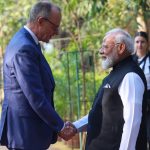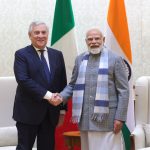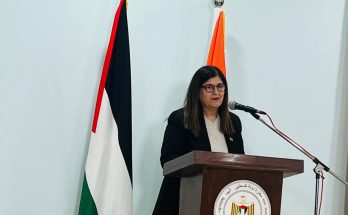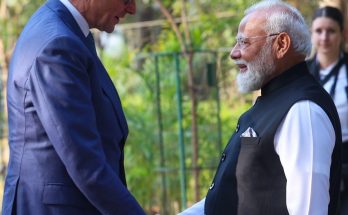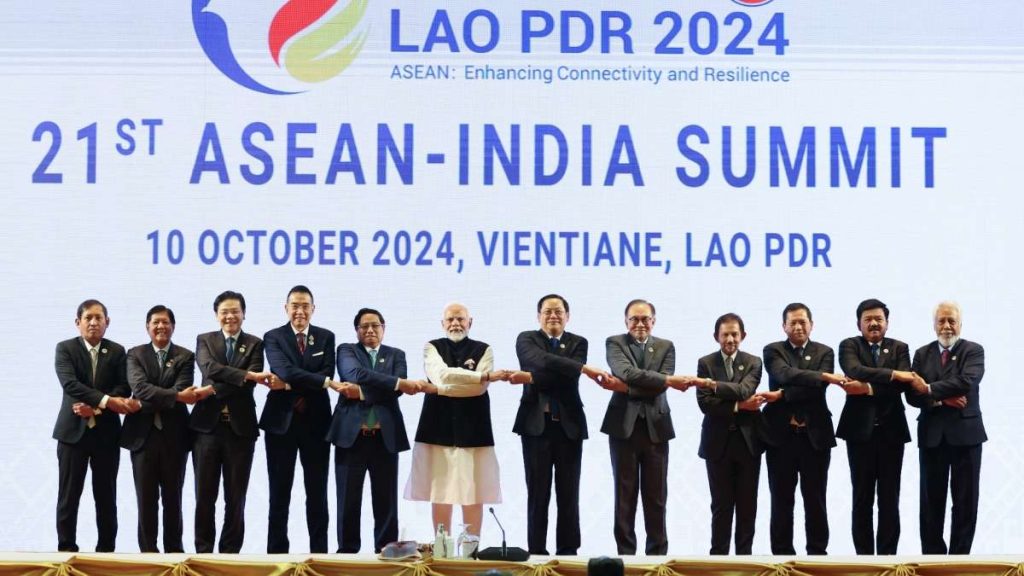
Vientiane/New Delhi: Raising the bar, India unveiled a 10-point agenda to bolster multi-faceted partnership between India and the 10-nation ASEAN that will pivot around enhanced connectivity, trade and investment and cooperation in emerging areas such as artificial intelligence.
Presenting the plan before the leaders of ASEAN countries at the 21st ASEAN-India Summit in Vientiane, Prime Minister Narendra Modi proclaimed: “The 21st century is the Asian century.” Aligning with the ASEAN Chair’s theme, “Enhancing Connectivity and Resilience”, PM Modi also batted vigorously for protecting freedom of navigation in contested territories such as South China Sea.
The summit marked the 10th anniversary of India’s Act East Policy, a strategic initiative that has significantly revitalized India’s engagement with Southeast Asia. As Modi pointed out, “Our trade with ASEAN has doubled in the last decade, crossing $130 billion,” making ASEAN one of India’s largest trading partners. His 10-point plan aimed at deepening these ties and addressing shared challenges across multiple sectors.
Key Highlights of the 10-Point Agenda
Modi’s 10-point agenda focused on practical, people-centric initiatives aimed at enhancing collaboration. He announced that 2025 would be celebrated as the ASEAN-India Year of Tourism, with India contributing $5 million toward joint activities to promote tourism in the region. As part of this initiative, India will focus on boosting tourism exchanges, further cementing people-to-people connectivity.
Prime Minister Modi also announced the doubling of scholarships for ASEAN students at Nalanda University, along with the provision of new scholarships for agricultural studies in India, underscoring India’s commitment to strengthening the knowledge partnership with ASEAN. Additional people-centric activities, including youth summits, start-up festivals, hackathons, and music festivals, are set to mark the decade of the Act East Policy.
Other notable elements included the ASEAN-India Women Scientists Conclave, fostering scientific collaboration, and the proposal to establish a regular ASEAN-India Cyber Policy Dialogue to address emerging cybersecurity threats and bolster digital resilience across the region. Another forward-looking component was the proposal for green hydrogen workshops, positioning India and ASEAN at the forefront of sustainable energy initiatives.
Reaffirming Freedom of Navigation
PM Modi reaffirmed India’s support for the ASEAN Outlook on the Indo-Pacific (AOIP) and stressed the importance of upholding international laws, specifically the United Nations Convention on the Law of the Sea (UNCLOS). “We are committed to maintaining peace and stability in the region, ensuring freedom of navigation and lawful maritime commerce,” PM Modi said. He emphasized that ASEAN and India must work together to promote the peaceful resolution of disputes, aligning closely with ASEAN’s vision for a free and open Indo-Pacific.
The joint statement issued by ASEAN and India echoed these sentiments, calling for the “early conclusion of an effective and substantive Code of Conduct in the South China Sea,” in accordance with international law. This statement reflects ASEAN’s strategic balancing act, maintaining close ties with both India and China while asserting its stance on freedom of navigation and maritime security.
Broader Regional Cooperation
Beyond defence and maritime security, Modi’s agenda placed equal importance on disaster resilience and public health collaboration. India announced the allocation of $5 million for enhancing disaster resilience in ASEAN and proposed the institutionalization of an ASEAN-India Health Ministers’ Meeting to boost health resilience, especially in the wake of the COVID-19 pandemic.
The two sides also decided to expedite the review of the ASEAN-India Trade in Goods Agreement (AITIGA) by 2025, which will simplify and modernize trade procedures. This revision is expected to unlock greater economic potential and strengthen the economic foundation of the ASEAN-India partnership. “We are neighbours, partners in the Global South, and a rapidly growing region in the world,” PM Modi remarked, emphasizing the shared future of India and ASEAN.
(Ananya Singh contributed inputs for this article)
Author Profile

- Manish Chand is Founder and Editor-in-Chief of India Writes Network (www.indiawrites.org) and India and World, a pioneering magazine focused on international affairs. He is CEO, Centre for Global India Insights, an India-based think tank focused on global affairs.
Latest entries
 India and the WorldFebruary 2, 2026Trump announces trade deal with India, Modi ‘delighted’
India and the WorldFebruary 2, 2026Trump announces trade deal with India, Modi ‘delighted’ India and the WorldJanuary 31, 2026Palestinian minister bats for mediatory role for India in ending Gaza conflict
India and the WorldJanuary 31, 2026Palestinian minister bats for mediatory role for India in ending Gaza conflict India and the WorldJanuary 13, 2026India, Germany raise the bar for defence, economic ties
India and the WorldJanuary 13, 2026India, Germany raise the bar for defence, economic ties India and the WorldDecember 12, 2025India-Italy bonding: Tajani’s visit raises the bar for business, maritime ties
India and the WorldDecember 12, 2025India-Italy bonding: Tajani’s visit raises the bar for business, maritime ties



